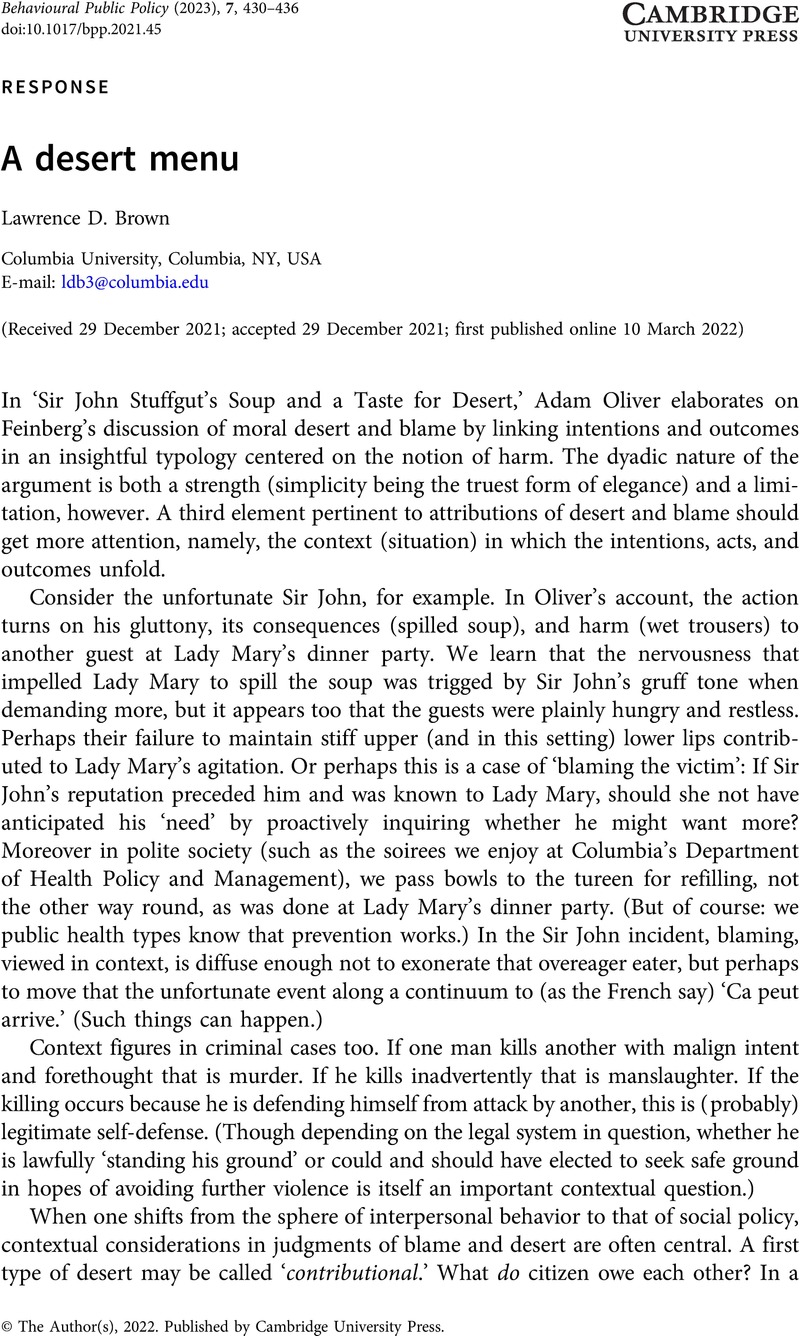No CrossRef data available.
Article contents
A desert menu
Published online by Cambridge University Press: 10 March 2022
Abstract
An abstract is not available for this content so a preview has been provided. Please use the Get access link above for information on how to access this content.

Information
- Type
- Response
- Information
- Copyright
- Copyright © The Author(s), 2022. Published by Cambridge University Press.
References
Boon, J. A. (2005), ‘Geertz's Style: a Moral Matter’, in Schweder, R. A. and Good, B. (eds), Clifford Geertz by his colleagues, Chicago: University of Chicago Press, 28–37.Google Scholar
Burke, V. J. and Burke, V. (1974), Nixon's good deed: Welfare reform. New York: Columbia University Press.Google Scholar
Caldwell, C. (2020), The age of entitlement: America since the sixties. New York: Simon and Schuster.Google Scholar
Dutton, P. V. (2021), Beyond medicine: Why European social democracies enjoy better health outcomes than the United States. Ithaca, NY: Cornell University Press.Google Scholar
Elliott, H., Bernstein, J. and Bowman, D. M. (2014), ‘Wellness as a worldwide phenomenon?’, Journal of Health Politics, Policy and Law, 39(5): 1067–1088.CrossRefGoogle ScholarPubMed
Grandin, G. (2019), The end of the myth: From the frontier to the border wall in the mind of America. New York: Metropolitan Books.Google Scholar
Macy, B. (2018), Dopesick: Dealers, doctors, and the drug company that addicted America. New York: Little, Brown.Google Scholar
Maynes, M. J. (1995), Taking the hard road: Life course in French and German workers’ autobiographies in the era of industrialization. Chapel Hill, NC: University of North Carolina Press.Google Scholar
Moynihan, D. P. (1973), The politics of a guaranteed income: The Nixon administration and the family assistance plan. New York: Random House.Google Scholar
Rogers, D. T. (2018), As a city on a hill: The story of America's most famous sermon. Princeton, NJ: Princeton University Press.CrossRefGoogle Scholar
Schmidt, H. (2007), ‘Personal responsibility for health-developments under the German healthcare reform’, European Journal of Health Law, 14(3): 241–250.CrossRefGoogle ScholarPubMed
Skocpol, T. (1995), Protecting mothers and soldiers: The political origins of social policy in the United States. Cambridge, MA: Harvard University Press.CrossRefGoogle Scholar
Stevens, R. and Stevens, R. (1974), Welfare medicine in America: A case study of Medicaid. New York: Free Press.Google Scholar
Stinchcombe, A. L. (2001), When formality works: Authority and abstraction in law and organizations. Chicago: University of Chicago Press.Google Scholar
Stone, D. A. (1984), The disabled state. Philadelphia: Temple University Press.CrossRefGoogle Scholar
Weaver, R. K. (2000), Ending welfare as we know it. Washington, DC: Brooking Institution.Google Scholar
Weaver, R. K. (2015), ‘Temporary assistance for needy families’, in Beland, D. (ed.), The oxford handbook of U.S. social policy, Oxford: Oxford University Press, 355–372.Google Scholar

